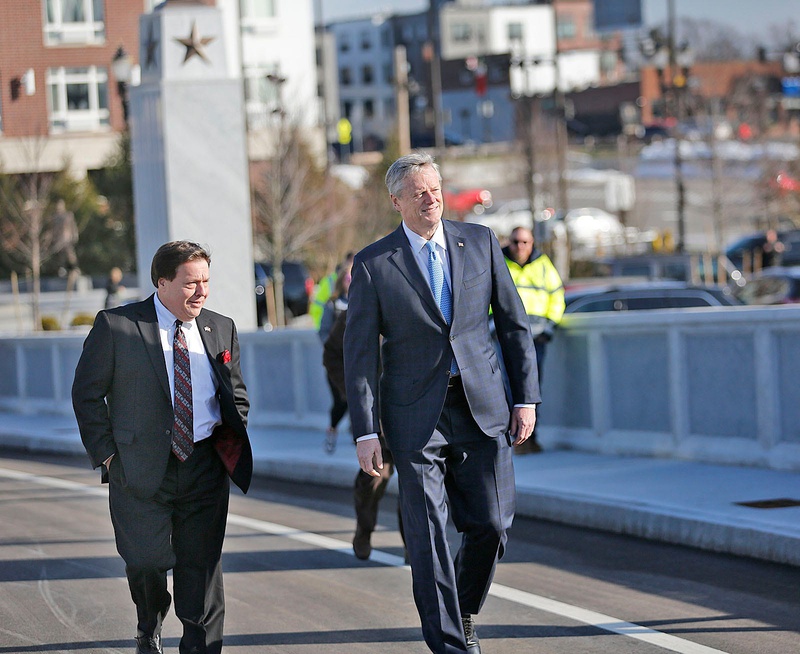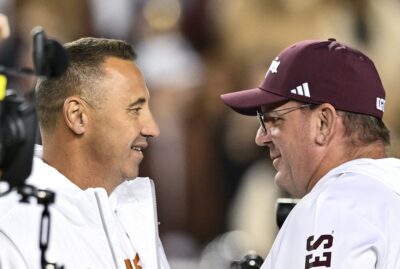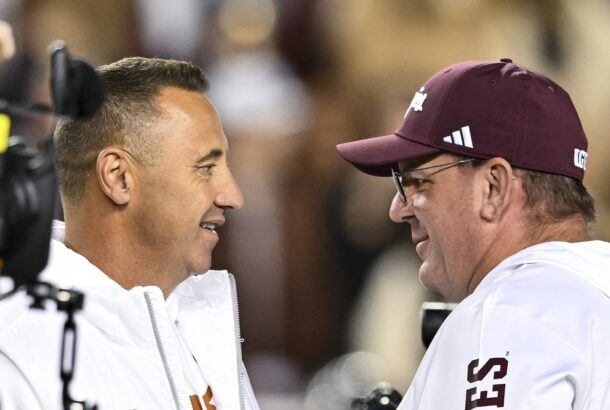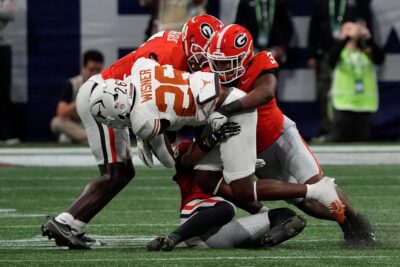Ad Disclosure

Hayes: New NCAA president just might save college sports from itself
By Matt Hayes
Published:
Now this is leadership. This is finding answers when all hope is lost.
The leaderless, rudderless NCAA finally got serious last December, moving away from the tin-eared, out of touch organization that had a favorability rating in the same zip code as the United States Congress.
And into the waiting arms of Charlie Baker.
It has taken all of 4 months on the job, but Baker — the new NCAA president — might just be on the verge of saving college sports from itself.
The Internal Revenue Service last week said in a memo that non-profit NIL collectives — of which there are many in the SEC and other FBS conferences — could be breaking the law because they are not tax-exempt.
The memo was as shocking as it was random because the IRS already approved some collectives for tax-exempt status.
“Nothing happens randomly,” an SEC athletic director told SDS. “They’re interested now because there’s someone at the top (of the NCAA) who knows how things work.”
This is what happens when you hire an outsider instead of inserting yet another former university president as the tip of the NCAA spear and paying him a couple million annually to deal with the heat.
Baker successfully ran the state of Massachusetts for 2 terms and is dialed in to the machine that is Washington, D.C. As governor of the 2nd-richest state in the U.S., Baker dealt daily with budgets and windfalls and shortfalls, and taxes and tax incentives and shelters.
A executive’s job revolves around money, and how to manage it. It should come as no surprise then that the answer to the existential threat pulling the NCAA deeper and deeper into life-threatening quicksand was right in front of it all along.
Nobody escapees the tentacles of the IRS.
The IRS collectives memo said benefits provided to college athletes through non-profit NIL collectives are “not incidental both qualitatively and quantitatively to any exempt purpose.”
Let me translate: It’s taxable income for anyone (see: fat cat boosters) fueling collectives, and Uncle Sam wants his share.
Baker has run the ol’ end around. He’s not trying to prevent players from earning off their name, image and likeness.
He just wants to tax the heck out of boosters who funnel millions into collectives to buy high school players. In this scenario, less money coming into collectives means less instability in college sports.
Football programs — and let’s not kid ourselves, football is ground zero in this fight — would then have to choose where the (significantly less) money goes. Do you pay current players (transfer or retaining) who have proven themselves on the field?
Or do you pay high school players who haven’t proven a thing?
The Pollyanna idea for NIL was using it as a reward for players currently on college rosters. It took all of 1 high school recruiting class — Texas A&M’s “greatest class ever” in 2022 — to change everything.
NIL was a significant factor in Missouri landing a top-15 class in 2022. It helped South Carolina land the No. 16 class in 2023, and TCU, Texas Tech, Colorado finish in the top 30.
The only rule is there are no rules, so don’t complain when programs use it to their advantage. But it most certainly isn’t being used for what it was intended.
More to the point, NIL has led to tampering: Current schools trying to entice players to leave another school.
“Free player movement is not the issue, it’s the inducements” LSU coach Brian Kelly said. “If somebody wanted to move because he wasn’t playing and wasn’t happy, that’s fine. But when he’s leaving because somebody is offering him more money to go to another school, that’s not free movement. That’s free agency.”
That, of course, was former president Mark Emmert’s lasting gift to the NCAA — and more specifically, FBS football. Instead of proactively finding guardrails for NIL during the 16 months before Florida and California bills became law, he threw open the doors to NIL and 1 year of free player movement on the first day it was available. And all hell broke loose.
When Emmert left, the house was burning and NCAA presidents realized they could no longer allow one of their own to put out the fire. So they hired the 1 guy who knew the landscape of the 1 place where they’ve had zero luck of late: Washington, D.C.
The IRS approved non-profit status for some collectives, and others continued to give with the idea that a ruling for 1 is a ruling for all. But that was before the tens of millions of dollars in “non-profit” money hit college sports.
That was before the IRS memo of last month that declared the goal was to, “promote consistent treatment of similarly situated taxpayers and sound tax administration.”
Charlie Baker might just save the NCAA from itself, everyone.
With a little help from Uncle Sam.
Matt Hayes is a national college football writer for Saturday Down South. You can hear him daily from 12-3 p.m. on 1010XL in Jacksonville. Follow on Twitter @MattHayesCFB




